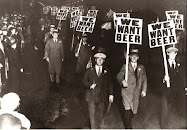Interesting Time article about efforts in several states to alter or eliminate bans on Sunday sales of Alcohol. What I find most interesting is that the arguments raised on both sides represent a very current debate about alcohol regulation and consumption.
On the one hand the repeal argument centers around increased tax revenue for states with ailing budgets, coupled with a modern consumer mindset of "I want what I want and I want it NOW". These forces are heavily at work in modern alcohol control policy. So for example many of the states contemplating repealing Sunday Blue Laws are in New England, and they are doing so because people are hopping the border to states that allow sales on Sunday. States are therefore losing tax revenue to neighboring states. On top of that, to many people these laws just seem silly. In an age of 24/7 supermarkets it seems ridiculous that one can't buy booze whenever one feels like it.
Which is where the counter-argument comes in. The article frames it as a sortof dogmatic Christian Right stance, and perhaps there is an element of that, but it is more than just the old warhorse of "Alcohol Bad! Family Good!" Many cities and/or states restrict the hours that alcohol is for sale, even if they allow sales on Sunday. And there are good social policy reasons for this. It's generally better if people who drink a little too much have to go sleep it off, rather than popping down to the corner store at 4:00 AM for another fifth of tequila.
At the heart of Sunday Blue Laws is an appeal to what the Supreme Court has called in its more recent cases the "Core Purposes" of the 21st Amendment. These are supposed to be the original goals of the Amendment, including things like taxation, orderly markets, and temperance. (And these 'goals' are not without criticism, Justice Stevens called it "a totally novel approach to the 21st Amendment" in his dissent in Bacchus v. Dias. Even today it's not entirely clear what these purposes are or are not).
Here it looks like we have a conflict between taxation and orderly markets on the one hand, and temperance on the other. If people are jumping borders on Sunday, states lose both tax revenue and control over the time, place and manner of the sale. And there is the problem of "Blood Borders", where consumers cross the border, drink alcohol, then drive back home while intoxicated. So the state's core purposes can be aided by a repeal of the Blue Laws and subsequent regulation of Sunday sales within the state's three-tier system.
On the other hand, the arguments for Temperance ignore the economic realities on the ground and speak to more idealistic social engineering. Some people won't bother driving across the border for a six-pack, and if they run out of alcohol they just won't drink. And a day where people drink less, maybe spend some time with their families, get some work done around the house, go out for a movie, etc. can't be all bad for society. Not only that, by forbidding sales on a specific day the state subconsciously reinforces the idea that a) it controls alcohol and that alcohol is not just another consumer good, and b) alcohol is in some sense still a vice, which is why it is regulated the way it is.
But ultimately such arguments seem a bit antiquated, and the problem for modern temperance control is crafting laws that keep the evils of excessive consumption down, but that don't make you look like some hatchet-wielding, saloon-smashing, "Demon Rum" shouting nutcase. And perhaps the repeal of Blue Laws, with a subsequent absorption of the market demand into the state three-tier, accomplishes this better than the unstated "Don't drink, go to Church." of existing Sunday Blue Laws.
Welp That's All Folks...
-
So as you might have noticed there was a huge lag in the blog. Everything's
fine here, no worries. Not mauled by rabid marmots or anything. Just been
reall...
12 years ago








